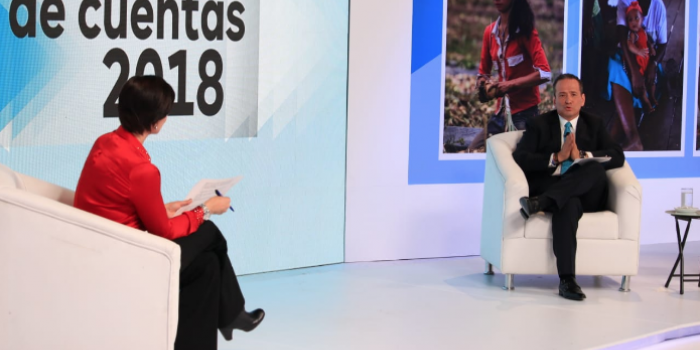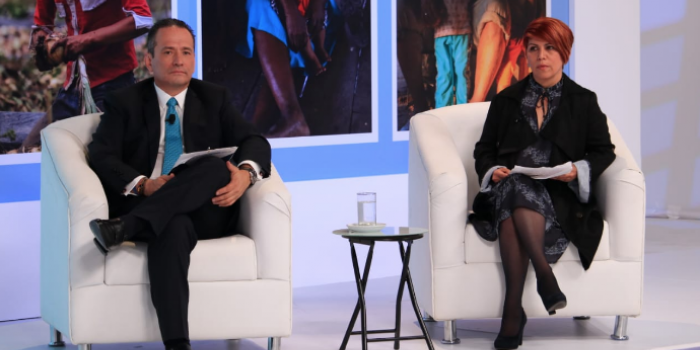
Victims Unit reported significant advances in attention, compensation, humanitarian aid and returns in 2018
This was ratified by different directorates of the entity, during the Accountability Hearing, which also highlighted achievements in emergency assistance, technical support, training, accompaniment and academic training for those affected by the conflict.



During the accountability of the Victims Unit, l a Directorate of Repair of the entity in 2018, confirmed that it processed more than 99,000 administrative compensation, with a contribution exceeding 566 billion pesos, with accompanying actions for an adequate investment of the resource. The report highlighted that five collective reparation plans were closed and about 700 reparative actions were implemented in 133 groups. Also, that collective compensation was obtained from 16 ethnic communities and two from the Rrom or Gipsy people.
It also recalled that he accompanied nearly 30,000 displaced victims in their return process and that he delivered more than 700 family support schemes for income generation. Through psychosocial support, it explained that the rehabilitation measure was developed in more than 54,000 individual victims and added that more than 1,400 community rehabilitation, satisfaction and non-repetition guarantees were implemented in groups, and closed the strategy Interlacing in 25 communities.
When relating the authorized transfers to victims, the delivery of more than 3,200 to the victims was reported as part of the judicial compensation and in compliance with the Justice and Peace sentences.
Interinstitutional Management
The Directorate of Interinstitutional Management, highlighted during the rendering of accounts that a total of 211,692 victims were treated in 2018, with programs of mayoral offices and governorates, and that 1,133 territorial entities benefited from training and constant support in the use of planning instruments and regional and local public management.
In its assessment, it indicated that they had managed to articulate and bring the institutional offer of 143 programs for victims at the national level and another 4,073 at the territorial level. It also registered that they designed and implemented the Differentiated Territorial Technical Assistance Strategy, which is divided into four categories: governorates, capital cities, municipalities with high capacity and low victim concentration, focused on 17 municipalities; and municipalities with low administrative and budgetary capacity and high concentration of victim population in 152 municipalities.
On the National Table for the Effective Participation of Victims, it was noted that its members had spaces for advocacy in strategic instances in relation to the implementation of the Peace Agreement, Development Programs with Territorial Approach (PDET) and Special Justice for peace.
Social and Humanitarian Management
For its part, the Directorate of Social and Humanitarian Management indicated that it attended 10,385,502 applications for victims in 2018 that correspond to a total of 6,011,878 people. It also revealed that 1,190 days of attention and service fairs were advanced, which benefited 647,631 households, with an investment of 564,179 million pesos, for humanitarian assistance due to forced displacement.
The Directorate of Social Management also highlighted the delivery of 1,485 money orders, worth more than $ 2,221 million, for humanitarian aid for victims of events other than forced displacement. "Through the face-to-face and non-face-to-face care schemes, a single interview was conducted with 478,066 households, corresponding to 1,361,071 victims of conflict," he stated in another of his results.
The balance indicated that in 2018 1,923 technical assistance was carried out in 908 municipalities and 27 governorates, which allowed updating 406 Contingency Plans, of the 1,036 formulated, as well as the verification of 516 humanitarian emergencies, the coordination for the attention of 76 humanitarian emergencies massive and 183 humanitarian missions developed to address this problem.
Ethnic issues
From the Unit's Ethnic Affairs Directorate, it was reported that 2018 was a year of great progress, since it was possible to assist all the subjects that are included as victims, belonging to Afro, indigenous and Rrom or Gypsy populations, it in the implementation of decrees Law 4633, 4634 and 4635 of 2011.
Regarding more results, it was indicated that the previous year, the Unit attended 30 collective subjects and that it advanced in the creation of a space for dialogue with the peoples of the Amazon through the Associations of Traditional Indigenous Authorities of the Amazon (AATIS), with whom 16 subjects of Collective Reparation are treated.
Additionally, progress was made in the formulation of Specific Repair Plans in Chocó, Cauca and Nariño, for a total of 13 community councils with formulated and validated plans, whose protocolization will be developed this year.
Address registration
In turn, the Registry Directorate highlighted that in 2018 it advanced in the qualification of the data, which impacts the procedures to analyze, assess and decide on applications for registration to the Unique Victims Registry, RUV. They also said that to offer updated information, they worked on the implementation of the Integrated Model that allows access to victim information, from all official sources, ensuring correct and timely data for the design of public policies.
Likewise, he alerted the progress of the design of Victimization Map, as a tool of memory and reconstruction, whose management is articulated with the Integral System of Truth, Justice, Reparation and Guarantees of Non-Repetition, the Integral System of Attention and Integral Repair to the Victims, and society in general.
(End/AMA/LMY)






